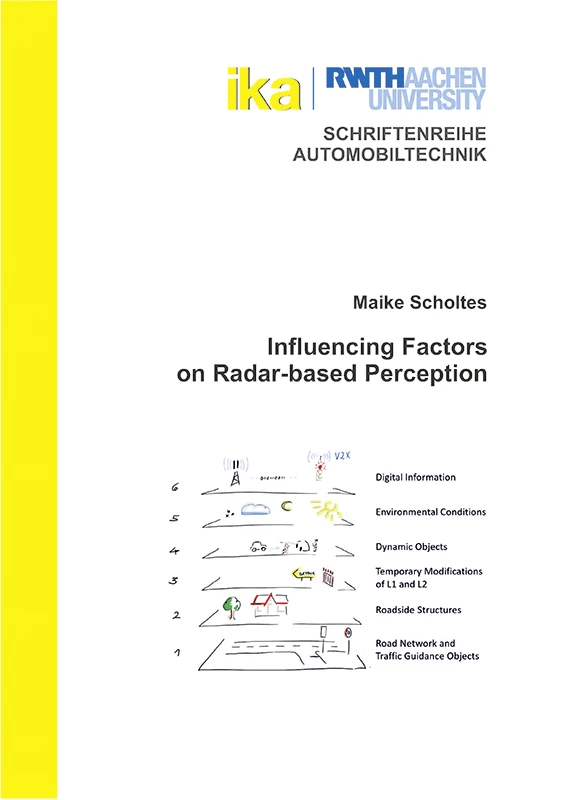Dissertation
Influencing Factors on Radar-based Perception
- Author:
- Maike Scholtes
- Pages:
- 243
- Keywords:
- automated driving, perception, radar, safety assurance
- Year:
- 2022
- Language:
- Format:
- ebook
While it is to be expected that the introduction of automated driving functions opens up new opportunities and increases the overall safety of road traffic, the process of proving reasonable safety of the function itself remains challenging. A promising approach to assess an automated driving function is the scenario-based approach. However, currently this approach does not take uncertainties in the perception of an automated vehicle into consideration to a great extent. Therefore, this thesis focuses on the question of how to include perception assessment in the approach and facilitate scenario selection in terms of perception aspects.
In order to achieve this, an iterative process is followed that combines a top-down and a bottom-up approach. In a first step, potential influencing factors on, in the case of this thesis, radar-based perception are analyzed through the help of different information clusters. Since perception is heavily influenced by the unstructured and complex environment, a description model needs to be developed in a second step to structure the derived influencing factors. In order to decrease complexity, the description model follows a layered approach to classify the environment. In addition, sensor specific aspects are added to the model by an independent sensor dimension that is of great importance for the following steps. The developed description model is subsequently used to facilitate real-world data analysis. In the context of this work, naturalistic driving data in the form of two different datasets and accident data are analyzed. This analysis is the basis for the bottom-up approach that constitutes the iterative process: Not only does it verify the theoretically derived influencing factors through real-world data, but the developed structuring concept and environment description model also help to find new potential influences that can be transferred back to the structured list of influencing factors. In doing so, the implemented concept combines an expert-based and a data-driven approach.
This multilevel approach does not only identify and provide influencing factors on radar-based perception, but also generates a model to classify those. The model and the classifications can be used to select scenarios and transform them into test cases in order to assess the perception of an automated driving function. While this thesis concentrates on radar-based perception, the transferability to other sensor modalities is also briefly discussed, making it a holistically feasible approach.
Service
Cooperations
Address
Institute for Automotive Engineering
RWTH Aachen University
Steinbachstraße 7
52074 Aachen · Germany


![[Logo: Institute for Automotive Engineering (ika)]](https://www.ika.rwth-aachen.de/images/ika-logo-a-blau-blau-rgb.svg)
